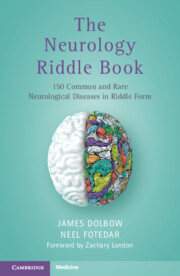Book contents
- The Neurology Riddle Book
- Series page
- The Neurology Riddle Book
- Copyright page
- Dedication
- Contents
- Foreword
- Preface
- 1
- 2
- 3
- 4
- 5
- 6
- 7
- 8
- 9
- 10
- 11
- 12
- 13
- 14
- 15
- 16
- 17
- 18
- 19
- 20
- 21
- 22
- 23
- 24
- 25
- 26
- 27
- 28
- 29
- 30
- 31
- 32
- 33
- 34
- 35
- 36
- 37
- 38
- 39
- 40
- 41
- 42
- 43
- 44
- 45
- 46
- 47
- 48
- 49
- 50
- 51
- 52
- 53
- 54
- 55
- 56
- 57
- 58
- 59
- 60
- 61
- 62
- 63
- 64
- 65
- 66
- 67
- 68
- 69
- 70
- 71
- 72
- 73
- 74
- 75
- 76
- 77
- 78
- 79
- 80
- 81
- 82
- 83
- 84
- 85
- 86
- 87
- 88
- 89
- 90
- 91
- 92
- 93
- 94
- 95
- 96
- 97
- 98
- 99
- 100
- 101
- 102
- 103
- 104
- 105
- 106
- 107
- 108
- 109
- 110
- 111
- 112
- 113
- 114
- 115
- 116
- 117
- 118
- 119
- 120
- 121
- 122
- 123
- 124
- 125
- 126
- 127
- 128
- 129
- 130
- 131
- 132
- 133
- 134
- 135
- 136
- 137
- 138
- 139
- 140
- 141
- 142
- 143
- 144
- 145
- 146
- 147
- 148
- 149
- 150
- Index
110
Published online by Cambridge University Press: 21 November 2024
- The Neurology Riddle Book
- Series page
- The Neurology Riddle Book
- Copyright page
- Dedication
- Contents
- Foreword
- Preface
- 1
- 2
- 3
- 4
- 5
- 6
- 7
- 8
- 9
- 10
- 11
- 12
- 13
- 14
- 15
- 16
- 17
- 18
- 19
- 20
- 21
- 22
- 23
- 24
- 25
- 26
- 27
- 28
- 29
- 30
- 31
- 32
- 33
- 34
- 35
- 36
- 37
- 38
- 39
- 40
- 41
- 42
- 43
- 44
- 45
- 46
- 47
- 48
- 49
- 50
- 51
- 52
- 53
- 54
- 55
- 56
- 57
- 58
- 59
- 60
- 61
- 62
- 63
- 64
- 65
- 66
- 67
- 68
- 69
- 70
- 71
- 72
- 73
- 74
- 75
- 76
- 77
- 78
- 79
- 80
- 81
- 82
- 83
- 84
- 85
- 86
- 87
- 88
- 89
- 90
- 91
- 92
- 93
- 94
- 95
- 96
- 97
- 98
- 99
- 100
- 101
- 102
- 103
- 104
- 105
- 106
- 107
- 108
- 109
- 110
- 111
- 112
- 113
- 114
- 115
- 116
- 117
- 118
- 119
- 120
- 121
- 122
- 123
- 124
- 125
- 126
- 127
- 128
- 129
- 130
- 131
- 132
- 133
- 134
- 135
- 136
- 137
- 138
- 139
- 140
- 141
- 142
- 143
- 144
- 145
- 146
- 147
- 148
- 149
- 150
- Index
Summary
First described by Swiss scientist Charles Bonnet in 1760 in the case of a 90-year-old man with cataracts suffering from complex visual hallucinations in the absence of a psychiatric condition, Charles Bonnet syndrome (CBS) has become a well-known phenomenon of complex visual hallucinations in those with decreased visual acuity. Charles Bonnet syndrome can occur secondary to any disease or condition that decreases visual acuity including diabetic retinopathy, age-related macular degeneration, cerebral infarction, cataracts, glaucoma, optic ischemic or inflammatory disease, or eye trauma. The prevalence of CBS remains relatively undefined; however, it is thought to be between 0.5% and 10% of those with low visual acuity and more common in the elderly. The prevalence, however, is thought to be underestimated due to significant underreporting of visual hallucinations by the affected patient given the stigma of psychiatric illness. The most common cause of CBS is age-related visual acuity loss, particularly macular disease and glaucoma, with the most common age of symptom onset from 70 to 85 years. There is no clear male or female predominance.
Information
- Type
- Chapter
- Information
- The Neurology Riddle Book150 Common and Rare Neurological Diseases in Riddle Form, pp. 343 - 346Publisher: Cambridge University PressPrint publication year: 2024
